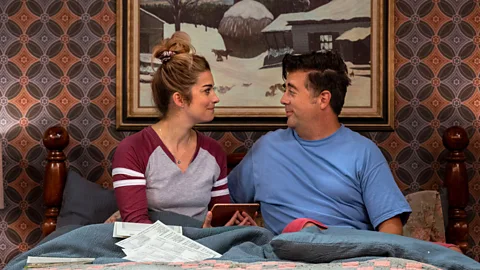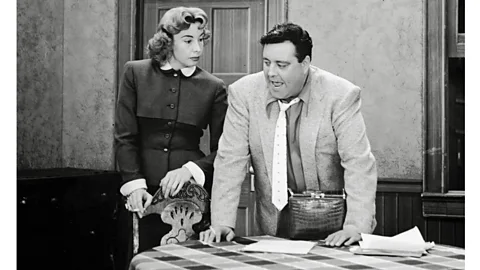Is this TV's most toxic stereotype?
 AMC
AMCA dark new show draws attention to one of television's longest-running tropes. But what does the embattled sitcom wife reveal , asks Caryn James.
At first glance, Kevin Can F*** Himself – as AMC is calling its new series, asterisks and all – seems to be a creaky old sitcom about an oafish husband, Kevin, and his smarter, put-upon wife, Allison (Annie Murphy of Schitt's Creek fame). But after the opening scene, this clever comedy-drama reveals its true, subversive nature.
More like this:
Allison walks from the living room, where Kevin has just tossed his empty beer mug into her laundry basket to the sound of canned laughter, into the kitchen. As the lighting darkens dramatically, Allison looks straight into the camera, and with a despondent look on her face, smashes the mug into pieces. From then on, Kevin Can... veers back and forth between traditional sitcom scenes of domestic misadventures with punchlines, and Allison's reality – where she has a boring job in a shop and fantasises about taking the broken handle of the mug and stabbing Kevin in the neck. The show is an expression of "feminist rage", its creator Valerie Armstrong tells BBC Culture, exposing how unhappy those decades of smiling sitcom wives must have been.
Like recent Marvel show WandaVision, with its spoofs of classic family comedies from the 1950s through to the 2010s, Kevin Can… comments on the strange persistence of the retro trope of the patient, subservient wife. While society has moved forward, the stereotype remains potent enough to be a target of satire, so firmly embedded in the culture that it is easily understood – even by younger audiences. WandaVision acknowledges the unreality of the television image, a fantasy that Wanda temporarily lives in, whereas Kevin Can… sets Allison on a course of revenge. In both series, it is satisfying to watch that image explode.
 Marvel Studios 2020
Marvel Studios 2020But the trope is also used unironically in current series like the new Netflix comedy The Upshaws and CBS's ongoing The Neighbourhood, with doltish husbands and the wives who alternately nag and humour them. These straightforward shows suggest that society – which TV so often reflects – is far from accepting fundamental change.
A deep-rooted caricature
The prototype of the sitcom wife goes all the way back to Alice Kramden in the classic 1950s comedy The Honeymooners. She was a stay-at-home wife in a dress and apron, sharp-tongued and smarter than her husband, Ralph (Jackie Gleason), a portly bus driver full of bluster about being king of the castle. Her legacy was ed on to sitcom mothers, baking cookies in pearls and heels in shows like Leave It to Beaver and Father Knows Best (a revealing title if ever there was one). That character was a fantasy even in the 50s, but it was aspirational.
 Alamy
AlamyThe stereotype lingered on even as women's rights improved. One of the longest-running examples of the old sitcom model is The King of Queens, a comedy that ran from 1998 to 2007, starring Kevin James as a delivery driver married to an overbearing wife. A similar follow-up series, Kevin Can Wait, whose title Kevin Can F*** Himself bluntly references, ran from 2016 to 2018. In The King of Queens, the wife is more mother than partner, scolding her husband and his poker-playing friends and trying to control his diet. She has a job as a secretary, but that is a mere sop to 21st-Century reality. Otherwise she might as well be Alice Kramden, in a scenario almost designed to make you wonder, "What in the world did she see in him">window._taboola = window._taboola || []; _taboola.push({ mode: 'alternating-thumbnails-a', container: 'taboola-below-article', placement: 'Below Article', target_type: 'mix' });
